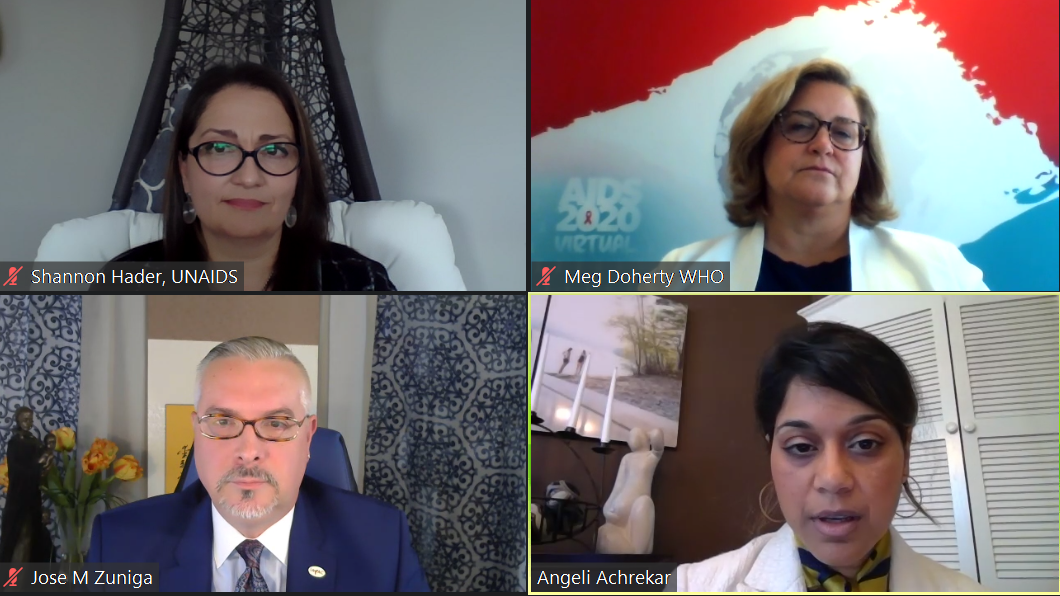Global Experts Warn of COVID-19-Related HIV Service Disruptions
Over two days preceding the 23rd International AIDS Conference (AIDS 2020), the International Association of Providers of AIDS Care (IAPAC), in partnership with the Joint United Nations Programme on HIV/AIDS (UNAIDS) and International Treatment Preparedness Coalition (ITPC), hosted the sixth 90-90-90 Targets Update. Not surprisingly, COVID-19 loomed over most of the discussions related to progress, barriers, and opportunities for attaining and surpassing the targets at global, national, and municipal levels.

Representatives from UNAIDS, IAPAC, the World Health Organization (WHO), and U.S. President’s Emergency Plan for AIDS Relief (PEPFAR), raised concerns about disruptions to health services for people living with HIV caused by the response to the COVID-19 pandemic.
“We could have an additional 500,000 AIDS-related deaths, including [tuberculosis], by the end of the year if the severe disruptions were to continue for another six months,” said UNAIDS Executive Director Winnie Byanyima during a conversation with IAPAC President/CEO Dr. José M. Zuniga on June 30, 2020, that focused on HIV, COVID-19, and health inequalities.
Ms. Byanyima added that cost must not become a barrier to treatment for people who acquire the novel coronavirus, SARS-CoV-2, and renewed her advocacy for a “People’s Vaccine” against COVID-19, which more than 140 world leaders and public health experts are calling for, noting that “access to vaccines and treatments as global public goods are in the interests of all humanity.”
In opening the dialogue with Ms. Byanyima, Dr. Zuniga cited data from a recently completed IAPAC survey of more than 500 clinicians treating people living with HIV. The survey results revealed significant disruptions in access to critical HIV services, as well as an overall 53% repurposing of the HIV health workforce to manage COVID-19 across the 75 countries where the survey was fielded.
“Any disruption to HIV and health services can turn a local crisis into a humanitarian catastrophe, which we are all trying to avoid,” said Dr. Zuniga, who also spoke to the work that Fast-Track Cities are doing to mitigate HIV service disruption while coping with burgeoning local COVID-19 epidemics. “The global HIV community is focused on leveraging innovation, facilitating community engagement, and prioritizing human rights to mitigate potential harm to people living with and affected by HIV. Sustained access to quality health services is vital to ending the HIV and COVID-19 pandemics.”
In a second 90-90-90 Targets Update session focused on HIV and COVID-19 held on July 1, 2020, representatives from UNAIDS, WHO, and the US President’s Emergency Plan for AIDS Relief (PEPFAR) discussed innovations that are being implemented to minimize HIV service disruptions.
Dr. Meg Doherty, Director of the WHO’s HIV, Hepatitis, and STIs Programs, offered insights from a recent survey of countries reporting partial or complete disruptions across 25 types of health services, including non-communicable disease diagnosis and treatment (69%). According to Dr. Doherty, part of the work that the WHO is advancing relates to understanding if there is a particular relationship between HIV and COVID-19. She added that although data indicate there is an increased risk of death due to COVID-19 among people living with HIV, ultimately, non-communicable diseases such as diabetes and hypertension have thus far been associated with the most severe disease complications and increased mortality.
“Bigger disruptions are seen in routine immunization (up to 70%), family planning, and certainly antenatal care, and these are also important for people living with HIV, because these are important entry points,” said Dr. Doherty. “We know that people are not coming to services and that we have to get those services back up and running in a safe manner.”
Differentiated service delivery, multi-month drug dispensing of antiretroviral (ARV) drugs, and telemedicine platforms were among the innovations cited by Dr. Angeli Achrekar, Principal Deputy US Global AIDS Coordinator, during a presentation about PEPFAR’s efforts to maintain the continuity of HIV services in more than 50 countries.
“Ensuring continuity of care for people living with HIV is a primary concern and focus of ours to really ensure that those 15.7 million people that we have on life-saving treatment are maintained on that service, as well as maintaining virologic suppression,” said Dr. Achrekar.
In relation to multi-month dispensing of ARV drugs, the WHO’s Dr. Doherty also remarked that, while the strategy is prudent in light of COVID-19-related restrictive measures, the potential for stock-outs must also be taken into consideration.
Dr. Shannon Hader, UNAIDS Deputy Executive Director, Programs, warned that even a six-month disruption in the supply of ARV drugs could set global progress on AIDS back over a decade. After the acute phase of the crisis has passed, she concluded, it will be vital to ensure that healthcare commodities continue to remain available to people living with HIV. But she stressed that above these operational considerations, all parties engaged in the COVID-19 response must facilitate a rights-based approach that places affected communities at the center of HIV and COVID-19 responses.
“Early on, there was a lot of discussion when public health responses for COVID were being talked about, ‘Oh well you know it’s a trade-off between public health and human rights, and we’re just going to have to live with it,’” said Dr. Hader. “We know from HIV that the most effective public health response, that gets to the endgame, is also a rights-based and community-led response. They’re not in conflict at all.”
Other sessions featured during the 2020 90-90-90 Targets Update included:
- Global Targets, National Impact: Country 90-90-90 Case Studies
- Fast-Track Cities in Action: Municipal 90-90-90 Case Studies
- Community Perspectives on 90-90-90 and Zero Stigma
- Defining New Metrics for HIV Prevention, Treatment, and Stigma
- Creating Enabling Environments for Optimal HIV Responses
The 2020 90-90-90 Targets Update was made possible through corporate sponsorships from ViiV Healthcare and Gilead Sciences.





